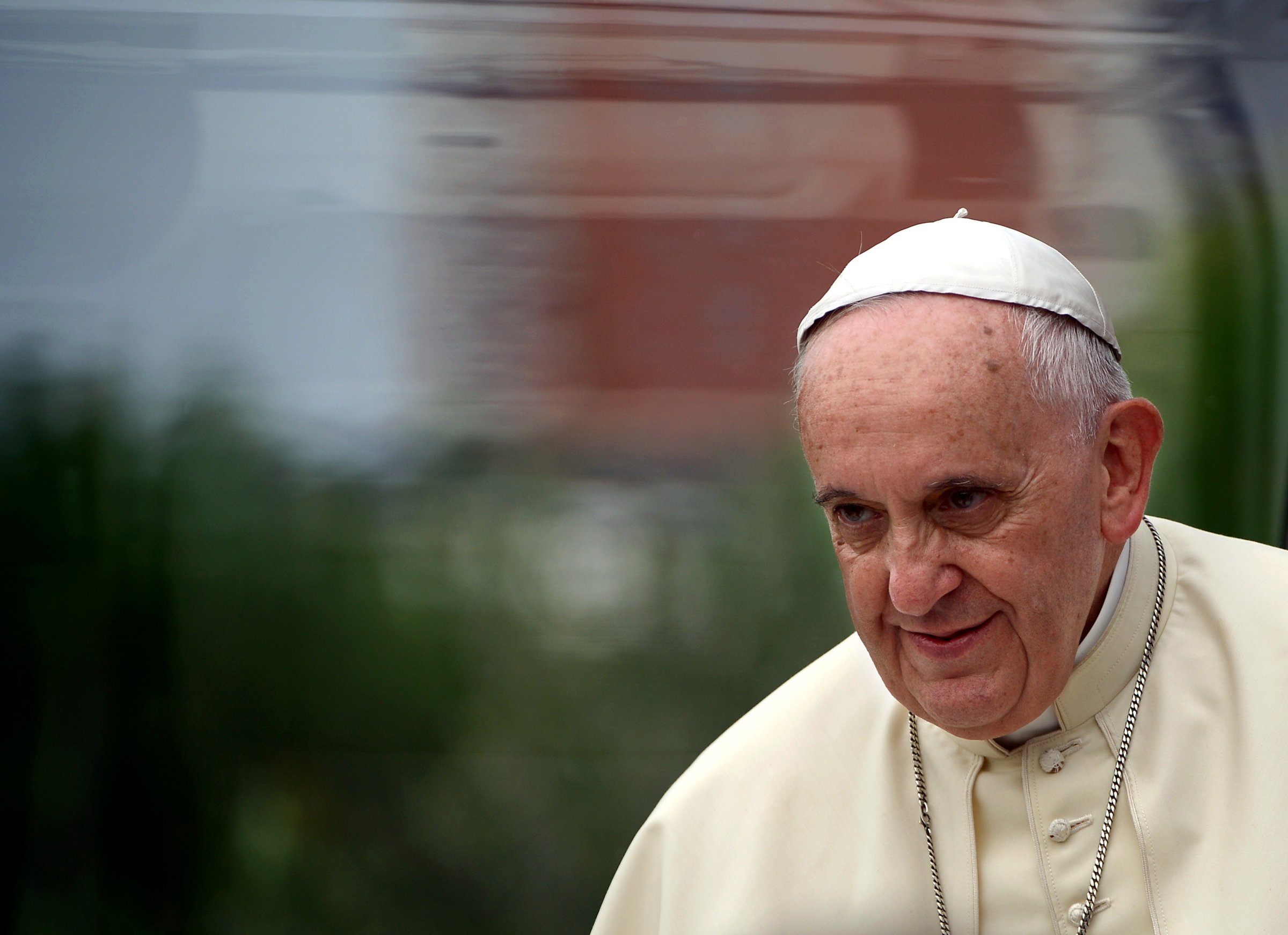
One voice has so far remained quiet since the United States and five allied Arab nations launched airstrikes in Syria against the Islamic State of Iraq and Greater Syria (ISIS) late Monday: That of Pope Francis.
The Holy Father’s silence is a complete contrast to his all-out effort a year ago this month—almost to the week—to prevent U.S. military strikes against the Syrian regime. Then, Pope Francis dominated the news cycle with his message opposing U.S. intervention. He wrote a letter to Russian President Vladimir Putin, host of the G-20 summit that President Barack Obama was attending, urging leaders to oppose military intervention in Syria: “To the leaders present, to each and every one, I make a heartfelt appeal for them to help find ways to overcome the conflicting positions and to lay aside the futile pursuit of a military solution,” he argued.
The Pope singled out a Syrian refugee family during a private visit to the Astalli refugee center in Rome so he could hear their story. He flooded his Twitter feed with messages like, “War never again! Never again war!” and “How much suffering, how much devastation, how much pain has the use of arms carried in its wake” and “With all my strength, I ask each party in the conflict not to close themselves in solely on their own interests. #prayforpeace.”
He declared a day of prayer and fasting for Syria and held a five-hour prayer service in St. Peter’s Square as the U.S. and France contemplated military strikes. “How many conflicts, how many wars have mocked our history?” he asked the tens of thousands of faithful gathered. “Even today we raise our hand against our brother. … We have perfected our weapons, our conscience has fallen asleep, and we have sharpened our ideas to justify ourselves as if it were normal we continue to sow destruction, pain, death. Violence and war lead only to death.”
The United States Conference of Catholic Bishops (USCCB) sent letters to all members of Congress urging them to vote against military intervention in Syria. The USCCB also wrote to President Obama to make clear that for the Pope and Middle Eastern Bishops “a military attack will be counterproductive, will exacerbate an already deadly situation, and will have unintended negative consequences.”
The Pope’s messaging this past week could not be more different. As the U.S. has considered its next steps in combating the ISIS threat, @Pontifex’s tweets have been about spiritual poverty and God’s love that does not cease. In his visit to Albania, he briefly rebuked (unnamed) religious militants who act in the name of God—“May no one use religion as a pretext for actions against human dignity,” he told diplomats at the presidential palace on Sunday—but that’s about it.
Why the change? Certainly the political landscape has shifted over the past year. The ISIS threat has risen to the global scene, and these latest airstrikes are targeting militant groups rather than Assad’s regime. Russia may now seem like less of an obvious partner for peace after its actions in Ukraine. Pope Francis himself has a panoply of issues on his agenda, from migration crises to Vatican financial reform to the upcoming Extraordinary Synod on the family. Plus, there is the risk that the appearance of Vatican support for military intervention against ISIS could flame a “Christian v. Muslim” narrative that could further endanger religious minorities in the region.
The Pope is not usually a figure world leaders look to for foreign policy advice when considering military action—his role is more one of a moral symbol, and so his voice is relevant chiefly for its perceived influence in shaping public opinion. The Catholic Church traditionally holds to the theory of just war, historically accepting military intervention as a sometimes necessary step toward peace. But no one expects a symbol of peace to ever be an advocate for war — and so the Pope’s silence may be as close as the Holy See gets to giving an endorsement.
Francis did hint at his approval of the U.S. bombing campaign in Iraq last month, when it began targeting ISIS positions there. So long as the international community was involved, and not just a sole actor, he told a reporter on his return flight from South Korea, “I can say only it’s licit to stop an unjust aggressor.”
He also sent special envoy Cardinal Fernando Filoni to Iraq to visit displaced and threatened minorities—Christian, Yezidi, and other—in August. “The Church as Church is and will always be against war,” Filoni, who was the Vatican’s ambassador to Iraq under Sadaam Hussein, said upon returning. “But these poor people have the right to be defended. They have no weapons, they have been driven out from their homes in a cowardly way, they have not engaged the enemy.”
But silence about human rights more broadly however has its risks, especially in pivotal political moments like we are seeing this week. Veteran Vatican reporter John Allen Jr. put what’s at stake in the Pope’s diplomatic career best. “To date, the only concrete diplomatic success to which Francis can point is helping Syrian President Bashar al-Assad cling to power by opposing Western strikes [last year],” Allen wrote for the Boston Globe’s new Catholic site Crux. “Yet assuming that Assad reasserts control, the question is whether Francis will use the Church’s resources to promote greater respect for human rights and democracy. If not, his major political accomplishment could go down as propping up a thug.”
More Must-Reads from TIME
- Donald Trump Is TIME's 2024 Person of the Year
- Why We Chose Trump as Person of the Year
- Is Intermittent Fasting Good or Bad for You?
- The 100 Must-Read Books of 2024
- The 20 Best Christmas TV Episodes
- Column: If Optimism Feels Ridiculous Now, Try Hope
- The Future of Climate Action Is Trade Policy
- Merle Bombardieri Is Helping People Make the Baby Decision
Contact us at letters@time.com